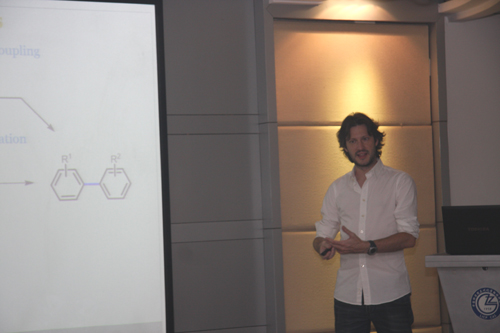 Dr. Igor Larrosa is introducing his group’s work. Dr. Igor Larrosa from School of Biological and Chemical Sciences, Queen Mary, University of London visited Lanzhou Institute of Chemical Physics of the Chinese Academy of Sciences (CAS) and delivered a lecture entitled Au, Ag, and Pd in C-H activation: reactivity and selectivity control on September 9. The development of greener and more efficient synthetic methodologies is essential for organic chemistry to reach its full potential in its application to many applied and fundamental scientific problems. Direct C–H arylation, where a readily available Ar-H is coupled with Ar-X, and oxidative double C–H activation, where two different Ar-H are cross-coupled, have emerged in the last few years as promising alternatives to traditional cross-couplings. These approaches use non-prefuntionalized starting materials, thus eliminating several synthetic steps and the associated waste en route to the desired cross-coupling adducts. However, several challenges have to be resolved before this new approaches can be widely applied. In his lecture, he presented some of his group’s approaches towards addressing these challenges. Igor was born in Barcelona, Spain. He received his undergraduate education at the Universitat de Barcelona (1999) where he also underwent M.Sc. and Ph.D. studies with Felix Urpi and Pere Romea on asymmetric C-glycosilations. A fellowship from Ministerio de Educacion y Ciencia supported three month's research in Professor Erick M. Carreira's laboratories at ETH Zurich, Switzerland. With a second fellowship he started postdoctoral research in Professor Anthony G. M. Barrett's group at Imperial College London, UK, where he was appointed group leader and carried out research on the synthesis of the natural products clavilactone and lactonamycin. In September 2007 he started his independent career as a Lecturer in organic chemistry at Queen Mary University of London, and was promoted to Senior Lecturer in 2011 and to Reader in Catalysis in 2012. The group’s current research is focused on developing novel synthetic methodologies in the areas of C-H and decarboxylative activation |
